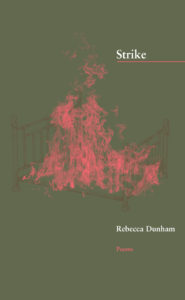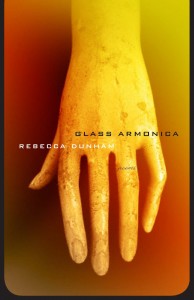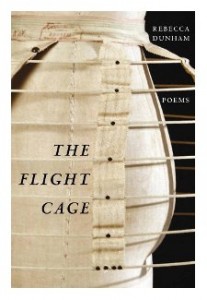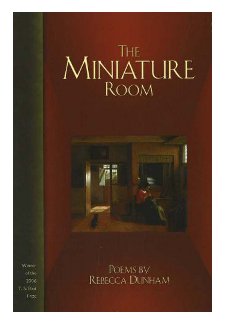 2018 Editor’s Choice, New Issues Poetry & Prose
2018 Editor’s Choice, New Issues Poetry & Prose
“In Rebecca Dunham’s gorgeous new book there are secrets, shames, and a fury that bites like frost. Strike reminds me that ‘fidelity / demands not only virtue’s deep mortal stab, / but the love of it’; that anger burns clean; that forgiveness can burden the one who was hurt, asking them to console the one who made them suffer. Dunham brings to light a rage that has felt unutterable to me for so long, as well as the lineage of women who know betrayal’s slow burning. When you read this stunning book, you can’t fail to feel these poems strike you as well, how even after you set it down, you can still feel the scorch of it.” —Traci Brimhall
“The poems of Rebecca Dunham’s Strike invoke the terse, noiseless monstrousness of the toxic-domestic, the ‘once-us,’ in which ‘to fall numb is not to fall/out of pain.’ This collection is Plathian in its riven depiction of anger, which both ‘presses/down and in,’ where denial ‘is beaten to silver foil, to silver leaf,’ and in which ‘[o]ver the butcher/paper’s sheets’ her ‘red story sprawls.’ In poems whose edges are honed on a whetstone of impeccable craft, and which delve into history, archetype, and ekphrasis, Dunham exposes the face that ‘ripples beneath her mask’ and builds a ravishing myth of the unveiled lyric interior.” —Diane Seuss
“D.T. Suzuki describes the start of a bad poem as one that ‘does not fly straight to the target, nor does the target stand where it is…’ Rebecca Dunham’s Strike is a campaign of targets all hit, dead-center, by furiously composed poems—arrows that cannot miss. Whether real life fortifies her aim, or pure imagination, or the progeny of both, the reader need not know. What matters is that this writer is on fire—and for sharing her archery, her heartache, and her hunger for catharsis, we thank her, as this is poetry that confirms the weirdly compatible damnation and grace of language used to expunge and expose and exalt. ‘Heap of tortured hairpins/at my feet…,’ Strike hurts, and thereby saves.” —Larissa Szporluk
 “An Elegy for our Endangered Environment.”
“An Elegy for our Endangered Environment.”
“One of the most anticipated, and most needed poetry collections of 2017.” Bustle
A searing, urgent collection of poems that brings the lyric and documentary together in unparalleled ways—unmasking and examining the specter of manmade disaster.
On September 20, 2010, an explosion on the Deepwater Horizon oil rig killed eleven men and began what would become the largest oil spill ever in US waters. On August 29, 2005, Hurricane Katrina made landfall in Louisiana, leading to a death toll that is still unconfirmed. And in April 2014, the Flint water crisis began, exposing thousands of people to lead-contaminated drinking water. This is the litany of our time—and these are the events that Rebecca Dunham traces, passionately and brilliantly, in Cold Pastoral.
In poems that incorporate interviews and excerpts from government documents and other sources—poems that adopt the pastoral and elegiac traditions in a landscape where “I can’t see the bugs; I don’t hear the birds”—Dunham invokes the poet as moral witness. “I owe him,” she writes of one man affected by the oil spill, “must learn, at last, how to look.”
Experimental and incisive, Cold Pastoral is a collection that reveals what poetry can—and, perhaps, should—be, reflecting ourselves and our world back with gorgeous clarity.
“One way to understand the power of this book is that it revises the pastoral tradition so as to make it meaningful in the time of Deepwater Horizon and Flint and other environmental disasters. Another way to understand it is as a meaningful and moving series of poems that explore how contemporary landscapes, with their human-made dystopias, stress and mangle relations between humans. And that it does all of this without giving up on the lyric, the form that was made to explore the intimacies between humans that we call love, is a sign of its timely power.”
―Juliana Spahr
“With each new collection of poetry, Dunham has pushed beyond the arresting achievement and sheer originality of the last book. Few poets of her generation are writing with such authority, grace, and eloquence.”
―Eric Pankey
“The environmental disasters of Cold Pastoral aren’t just the catastrophes that make the news. With panoramic detail, Rebecca Dunham’s poems unpack the ways in which small decisions can have enormous, unintended consequences. How, asks one poem, does one ‘continue in a world that disappears around me’? Dunham doesn’t offer any easy answers. Illuminating but not didactic, Cold Pastoral is an elegy for our endangered environment and the pastoral paradise of which we still dream.”
―Rebecca Hazelton
“‘Disaster was my god,’ wrote Rimbaud in A Season in Hell. Cold Pastoral offers the reader a series of lyric investigations of disasters, the devastation of the Deepwater Horizon oil rig its central crime scene. Sorrowing and lucent, Rebecca Dunham is as attentive to the threats to nonhuman species as she is to the men who died when the rig exploded: ‘Love can turn a man / to flame.’ Dunham’s poems find in disaster not exactly god, but the will toward meaning that disaster must manifest when it encounters a living language, eloquent as the wounds of Nature themselves.”
―Joshua Corey
 Winner of the 2013 Lindquist & Vennum Prize
Winner of the 2013 Lindquist & Vennum Prize
The eighteenth-century glass armonica, a musical instrument whose sound emits from rotating, water-filled vessels, has long held the power to mesmerize with its hauntingly sorrowful tones. Just as its song—which was once thought to induce insanity—wraps itself in and around the mind, Rebecca Dunham probes the depths of human psyche, inhabiting the voices of historical female “hysterics” and inciting in readers a tranquil unease.
These are poems spoken through and for the melancholic, the hysteric, the body dysmorphic—from Mary Glover to Lavinia Dickinson to Freud’s famed patient Dora. And like expert hands placed gently on the armonica’s rotating disks, Dunham offers unsettling depictions of uninvited human contact—of hands laid upon the female body, of touch at times unwanted, and ultimately unspeakable from behind the hysteric’s “locked jaws.” Winner of the 2013 Lindquist & Vennum Prize for Poetry, Dunham’s stunning third collection is “lush yet septic” (G.C. Waldrep), at once beautiful and unnerving.
“Dunham’s searing third collection glows like a magma vent underwater.”
—G.C. Waldrep, 2013 Lindquist & Vennum Prize for Poetry Judge“In lush, gorgeous language, the poems in Glass Armonica both enchant and unsettle us.”
—Nicole Cooley“Obliquely narrative, rich in lyric resonance and implicative catalog, the textured terms of Dunham’s Glass Armonica obtain an expansive portrait of the self as complex constellation, and in so doing oblige the reader’s own collaborative intimacy, yielding a genuine eros whose necessarily troubled song continues its music well beyond the page.”
—Scott Cairns“Reading Rebecca Dunham’s Glass Armonica is akin to discovering the sharpness of bone shard or shrapnel risen just beneath the surface of one’s skin: the odd advent of injury’s return despite the appearance of a wound thought long-healed. Face the holy and its unholy. Face the Error. Witness the pairing of Mystery and Woe, the equation of their shared vertigo. I’m pleased to report that every poem in this collection is wired to shatter its own lens on demand.”
—Cate Marvin“These gracefully exquisite poems navigate brutality, intrepidly seeking its origins and end. “The body does not discriminate,” writes Rebecca Dunham: the body intermingles weakness and strength. These physically intelligent poems lead toward durable understandings.”
—Joanie Mackowski
 A Tupelo Press Open Reading Selection
A Tupelo Press Open Reading Selection
Rebecca Dunham’s thrilling new book is a multilayered account of the struggles and torments faced by women as wives, mothers, and daughters — a psychological journey in which the poet seeks communion with writers from the past, including feminist pioneer Mary Wollstonecraft.
Using the metaphor of a “flight cage,” where birds are held captive, as physical manifestation of the space from which her speakers address us, Dunham reinvigorates the persona poem. Instead of “performing” historical figures such as Wollstonecraft, Dorothy Wordsworth, Anna Akhmatova, and Charlotte Perkins Gilman, she invites them to inhabit her, flickering in and out of sight, refusing an easy artifice.
A virtuoso of the phrase and image, Dunham displays a daring range of prosody. Drawing upon Wollstonecraft’s experimental travel narrative, the poet creates a threshold upon which the traditional “crown of sonnets” can be opened to the sudden breakage of collaged text, remaking both the received form and the now-conventional contemporary experimental poem.
Winner of the 2006 T. S. Eliot Prize
With tender probing and tight, expressive language, The Miniature Room explores the grace and power of the miniscule as it exists within an infinite universe. This 2006 T. S. Eliot Prize-winning collection utilizes rich imagery and complex interlocking meanings as author Rebecca Dunham builds off the classical themes of art, history, nature, love, life, religion, and motherhood to provide a sensual and inquisitive body of work.
This deeply melodious and intelligent gathering of poems, both painterly and literary in context, bears a stunning lushness of language and vision. There’s a mysterious pulse and scent permeating the exquisitely crafted, sometimes slightly ominous, images. Poems about a small son resonate inside a larger context—the wider natural world and all of civilization. One feels hypnotized inside a “slant” angle of perceptions unhampered by an intrusion of artifice. The Miniature Room is a manuscript of profound intention and finesse.
—Naomi Shihab Nye, 2006 T. S. Eliot Prize judge
